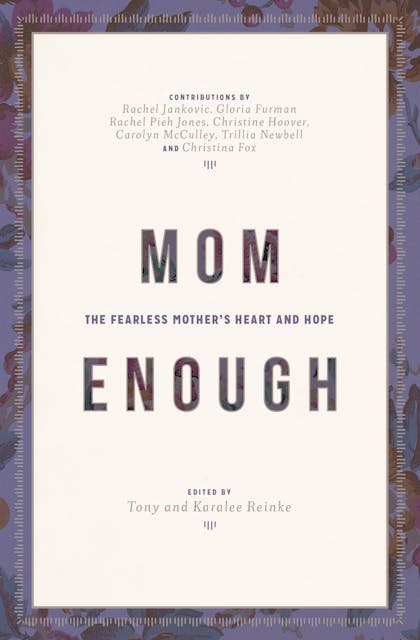Grace Greater Than All Our Worries
“Mommy, what’s the matter?”
My son can sense it. The tension and worry that saturates my heart oozes from my presence. “I just have so much on my mind. I forgot to do something, that’s all,” I replied.
But that’s not all. I say it like it’s not a big deal. But from the mouth of a child, his question reminds me that I shouldn’t feel this way. This burden I’m carrying on my shoulders seems to get heavier with each new day. Lately, my to-do lists have to-do lists.
With a hectic, busy life, full of responsibilities, I’m afraid I’ll forget something crucial and important. I worry that if I don’t do it (and there’s always an it), then no one else will. So I try to keep everything under my control. I’m constantly reminding myself of what I have to do. “I can’t forget this... ” “I better do that first thing tomorrow.” “It would be bad if I didn’t do this...” I focus on all the “what if’s,” and the worry consumes me. My child can see it because it’s etched across my face.
Yet I am fooling myself. I’m not really in control of anything. I could write a thousand to-do lists, and it wouldn’t matter. God is in control, not me. I’ve been bitten by a serpent-shaped lie that says I can orchestrate all the details of my life. That I can plan them and execute all on my own. The lie then produces fear when the reality crashes in that I actually can’t do it at all.
Because rather than being in control of all that I fear, fear has gotten control of me.
Trust vs. Worry
This desire to control our lives is common among us as mothers. We voice our worries to each other, talk about our stresses, and strategize how to make our lives smooth and problem-free. It’s an acceptable sin that joins many conversations, play dates, and texts. Sometimes we even encourage it among one another, attempting to out-do each other to see whose life is most worrisome and hectic. It seems so normal and commonplace, after all. I mean, what mother doesn’t worry? And if we didn’t, wouldn’t there be something wrong with us?
Jesus calls us to a different kind of life, one that’s contrary to the world. He calls us to a life of trust (Matthew 6:25–34). Trust is the opposite of worry. It requires that we believe all that God has told us about himself. It requires that we believe he is better than everything else, that we trust in his character, his goodness, and his grace (Psalm 9:10). It requires that we look back to all the ways he has provided for and strengthened us in the past. We know what he has said, and therefore we have the confidence in what he will do in the future. Trusting God requires that we believe he cares for us, that we keep our eyes on him, not our circumstances (1 Peter 5:7).
Remembering His Grace
The Israelites were told over and over in Scripture to look back at how God delivered them from slavery in Egypt. They were to remember his wonders at the Red Sea, his provisions in the desert, and how he brought them into the Promised Land. During yearly feasts, they celebrated what God had done for them and instructed their children in God’s faithfulness. But too often, they failed to remember. Instead they turned away from trust in God and relied instead on themselves and the culture around them.
We are also called to remember God’s grace in our lives. When worries creep in, when the cares of this life weigh us down, when everything seems out of control, we must remember all that God has done, and in continuing to do. We must recall our own story of deliverance from sin. We need to remember the lengths God went to — and continues to go to — in rescuing us from slavery through the shed blood of his Son at the cross. We need to remember where God decisively demonstrated his love (Romans 5:8). Because if he would sacrifice his own Son to save us, how will he not also with him graciously give us all things (Romans 8:32)?
If he saved us from our greatest fear — eternal separation from him — how can he not carry us through all our fears of today? If Christ conquered death when he rose triumphantly from the grave, how can he not also resurrect our joy from the pit of worry and despair?
Grace for Today and Every Tomorrow
Like the Israelites, we also forget and we stumble, but the cross is there to remind us of the gospel of grace. Just as the Israelites had to look to the bronze serpent for healing in the wilderness, we need to look to Christ. Looking to the cross and remembering the gospel frees us from the burdens that weigh us down. It pulls us from inward focus on ourselves and our efforts to make life work, and it focuses us back to the one who already accomplished it all.
When Jesus spoke the words, “It is finished,” he shut the door on our efforts to control our life. He put an end to all our strivings to get everything right in our own strength. And he opened the door to a forever rest, to freedom from sin, and to a peace that passes all understanding.
In this life, there will be plenty of reasons to worry. But we have more reasons to trust. God has been more than faithful in the past. Because he sent Jesus to rescue us from our sin, we can trust him with all our worries and fears, today and every tomorrow. When life’s unexpected challenges and overwhelming tasks tempt us to worry, when our to-do list gets long and sleep evades us, let us look to the cross and believe, trusting in what God has already done, and what he said he would do.

Mom Enough: The Fearless Mother’s Heart and Hope is a short book that explores the daily trials and worries of motherhood from the perspectives of eight women. In the trenches, they have learned (and continue to learn) how to treasure God and depend on his all-sufficient grace.
The paradox of this book is the secret power of godly mothering. Becoming mom enough comes from answering the question, “Are you mom enough?” with a firm “No. But God is God enough.”



